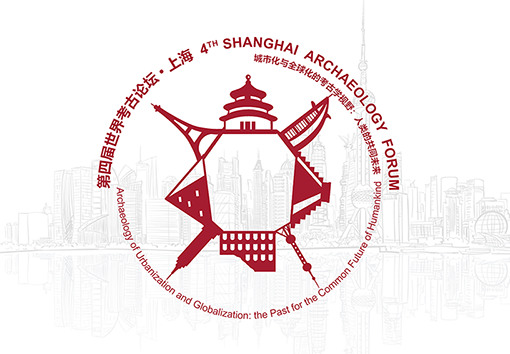The 4th Shanghai Archaeology Forum
第四届世界考古论坛·上海
14-17 December 2019
Shanghai, China
Archaeology of Urbanization and Globalization:
The Past for the Common Future of Humankind
城市化与全球化的考古学视野:
人类的共同未来
Founded in 2013, the Shanghai Archaeology Forum (SAF) is a global initiative dedicated to promoting the investigation, protection, and utilization of the world’s archaeological resources and heritage. It serves as an international platform to illuminate the significance and relevance of archaeological research to the world today. The forum is fully committed to excellence through innovation and cooperation, and to the sustainable development of our human society.
“世界考古论坛·上海”(SAF)成立于2013年,旨在推动世界范围内考古资源和文化遗产的调查、保护与利用,是宣传考古成果、促进考古研究、彰显文化遗产现代意义的国际平台。论坛致力于创新与合作,关注人类社会的可持续发展。
The 4th Shanghai Archaeology Forum was held from the 14th to 17th of December 2019 in Shanghai, China.
第四届世界考古论坛于2019年12月14日至17日在中国上海举行。
THEME
论坛主题
The closely related processes of urbanization and globalization are two of the defining trends of the 21st century. The current scale and intensity of urbanization and globalization are unprecedented in human history. Not only are people flocking to cities but, at the same time, cities are becoming more integrated into increasingly globalized networks of exchange. This has brought about huge social and environmental transformations, most noticeable in the past few decades. As humanity continues along this path, these changes may come to affect many, if not all, communities worldwide. Urbanization and globalization in today’s world have profoundly impacted the environment, economic prosperity, culture, as well as human health. They have created some of the world’s greatest social and economic challenges.
我们正生活在人类历史上规模空前、势不可挡的城市化和全球化进程中。城市吸纳着四面八方不断涌入的人口,与此同时,日益通达的全球交换之网又将世界各地的城市连为一体。这密切相关的两种进程,主导着21世纪的发展图景。无论社会还是环境,都因此发生了巨大的改变,并且还将继续改变,影响到芸芸众生的方方面面。全球化和城市化是全世界面临的巨大的社会与经济挑战。
Many of the processes conditioning contemporary urbanization and globalization, particularly their material and technological dimensions, are deeply rooted in the ancient world. The earliest cities developed in Mesopotamia, the Nile valley, the Mediterranean, the Indus valley, and China five to six thousand years ago, yet only 3% of the world’s population lived in cities by the beginning of the 19th century. This number, however, rose rapidly to 30% in 1950 and today, 55% of the global population lives in cities, spurred primarily by large-scale migration. Cities continue to grow globally and locally. The urban population worldwide is expected to increase to 70% by 2050 which will likely lead to the development of many more megalopolises.
当代城市化和全球化发展的诸多关键,尤其是物质和技术领域,皆深深根植于古代社会。五六千年前,最早的城市出现在美索不达米亚、尼罗河谷地、地中海沿岸、印度和中国。十九世纪初,城市居民仅占全球人口的3%,这个比例在1950年上升到30%。及至今日,由于大规模的人口迁徙,全球的城市居民已达55%。预计2050年,全球城市人口将增长到70%,极可能伴随着更多超大型城市的兴起。
Urbanization is often associated with globalization. Cities have always been essential to the long-distance movement of people, goods, and ideas in a cascading effect that has accelerated urban growth. Globalization results in the expansion of cultural, economic, and political activities internationally. As a process of interaction and integration among people, communities, cultures, and states, globalization is not a new phenomenon. It predates the 1980s, the so-called first era of globalization of the 19th century with the Industrial Revolution (which led to exponentially accelerated urbanization), and even Columbus’s voyage to the New World at the end of the 15th century. Globalization has a long history that stretches back thousands of years, as seen in the Silk Road across Eurasia during the Middle Ages, the late Bronze Age Mediterranean, the spread of Greek culture with the conquest by Alexander the Great, and many more instances.
一直以来,人口、资源和意识形态的长距离流动离不开城市,流动反过来又如活水般滋养了城市的生长。而文化、经济和政治活动的世界性蔓延,正是全球化的表征。可以说,全球化总是与城市化相伴相生。如果我们将全球化理解为人与人、社群与社群、文化与文化、国家与国家之间互动互融的过程,就会发现它绝非新鲜事物,它不是诞生于1980年代,其源头不是所谓“第一次全球化”的19世纪工业革命,也不是15世纪末哥伦布对新大陆的发现。全球化由来已久,有数千年的历史。中世纪贯穿欧亚大陆的丝绸之路、青铜时代晚期的地中海地区、伴随亚历山大东征的古希腊文明传播……凡此种种,都是早期全球化的可见之证。
Archaeology provides evidence not only of the material culture and social practices of urbanization and globalization in the past but also provides a substantial time depth from a range of cultural settings to enrich our understanding of both the temporal and geographical extent of globalization and urbanization. Unforeseen consequences of contemporary globalization and urbanization can emerge sometimes decades, and/or even centuries later. Studying the historical processes of globalization and urbanization from the long-term and comparative perspectives may elucidate how these trends evolved over time and how our human societies became systematically connected. Such a study can provide deep insights into the variations, interrelated processes, and long-term consequences of urbanization and globalization, and help engage us towards more sustainable development for our collective global future.
考古学不仅提供了城市化和全球化的物质文化和社会实践的历史证据,更在一系列文化背景中为这两个貌似年轻的议题赋予了长久的时间深度,从而能够促进我们对不同时期、不同地域全球化及城市化的深刻认识。当代全球化和城市化不可预见的结果,也许在几十年、甚至在几个世纪之后才显现出来。以长时段、比较性的视角研究城市化与全球化的历史进程有助于了解城市发展的时机和途径,以及考察人类社会是如何系统地彼此相连。我们希望这样的研究能够对城市化与全球化的多样性、互动过程和长远影响有所洞见,进而对人类共同家园的可持续发展有所助益。


